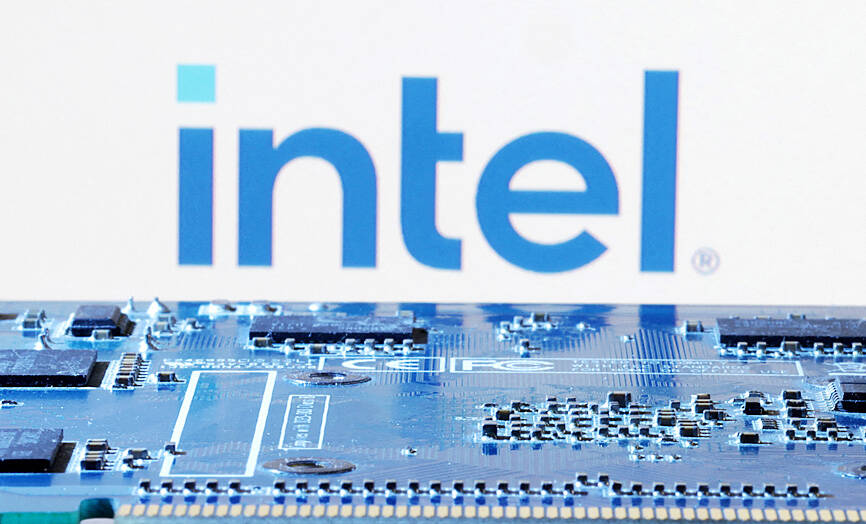Chip designers Nvidia Corp and Broadcom Inc are running manufacturing tests with Intel Corp, two sources familiar with the matter said, demonstrating early confidence in the struggling company’s advanced production techniques.
The two tests, which have not been reported previously, indicate the companies are moving closer to determining whether they would commit hundreds of millions of dollars’ worth of manufacturing contracts to Intel. The decision to do so could generate a revenue windfall and endorsement for Intel’s contract manufacturing business that has been beset by delays and has not yet announced a prominent chip designer customer.
Advanced Micro Devices Inc is also evaluating whether Intel’s 18A manufacturing process is suitable for its needs, but it was unclear if it had sent test chips through the factory.

Photo: Reuters
“We don’t comment on specific customers, but continue to see strong interest and engagement on Intel 18A across our ecosystem,” an Intel spokesperson said.
The tests by Nvidia and Broadcom are using Intel’s 18A process, a series of technologies and techniques developed over years that is capable of making advanced artificial intelligence processors and other complex chips. The process competes with similar technology from Taiwan Semiconductor Manufacturing Co (TSMC, 台積電), which dominates the global chip market.
Testing is under way and can last months. It is unclear when the tests started and manufacturing tests are no assurance that Intel would eventually win new business.
The 18A process was already delayed to next year for potential contract manufacturing customers.
Now, Intel has pushed back its timeline another six months, according to supplier documents reviewed by Reuters and two sources familiar with the matter.
Asked about the delay, Intel said that it would “begin ramping production in the second half of this year, delivering on the commitments we have made to our customers.”
The company added that it expects its factories to receive designs from customers this year.
Intel’s 18A process currently performs at a level between TSMC’s most advanced process and its predecessor, Synopsys Inc CEO Sassine Ghazi said in an interview.
Synopsys supplies some of the crucial intellectual property needed for Intel’s foundry.
Intel is expected to generate US$16.47 billion in revenue from the foundry business this year, although almost all of that revenue is from Intel itself. Revenue for the foundry segment declined 60 percent last year, and the company has said it would not break even until at least 2027.

Macronix International Co (旺宏), the world’s biggest NOR flash memory supplier, yesterday said it would spend NT$22 billion (US$699.1 million) on capacity expansion this year to increase its production of mid-to-low-density memory chips as the world’s major memorychip suppliers are phasing out the market. The company said its planned capital expenditures are about 11 times higher than the NT$1.8 billion it spent on new facilities and equipment last year. A majority of this year’s outlay would be allocated to step up capacity of multi-level cell (MLC) NAND flash memory chips, which are used in embedded multimedia cards (eMMC), a managed

In Italy’s storied gold-making hubs, jewelers are reworking their designs to trim gold content as they race to blunt the effect of record prices and appeal to shoppers watching their budgets. Gold prices hit a record high on Thursday, surging near US$5,600 an ounce, more than double a year ago as geopolitical concerns and jitters over trade pushed investors toward the safe-haven asset. The rally is putting undue pressure on small artisans as they face mounting demands from customers, including international brands, to produce cheaper items, from signature pieces to wedding rings, according to interviews with four independent jewelers in Italy’s main

CULPRITS: Factors that affected the slip included falling global crude oil prices, wait-and-see consumer attitudes due to US tariffs and a different Lunar New Year holiday schedule Taiwan’s retail sales ended a nine-year growth streak last year, slipping 0.2 percent from a year earlier as uncertainty over US tariff policies affected demand for durable goods, data released on Friday by the Ministry of Economic Affairs showed. Last year’s retail sales totaled NT$4.84 trillion (US$153.27 billion), down about NT$9.5 billion, or 0.2 percent, from 2024. Despite the decline, the figure was still the second-highest annual sales total on record. Ministry statistics department deputy head Chen Yu-fang (陳玉芳) said sales of cars, motorcycles and related products, which accounted for 17.4 percent of total retail rales last year, fell NT$68.1 billion, or

In the wake of strong global demand for AI applications, Taiwan’s export-oriented economy accelerated with the composite index of economic indicators flashing the first “red” light in December for one year, indicating the economy is in booming mode, the National Development Council (NDC) said yesterday. Moreover, the index of leading indicators, which gauges the potential state of the economy over the next six months, also moved higher in December amid growing optimism over the outlook, the NDC said. In December, the index of economic indicators rose one point from a month earlier to 38, at the lower end of the “red” light.